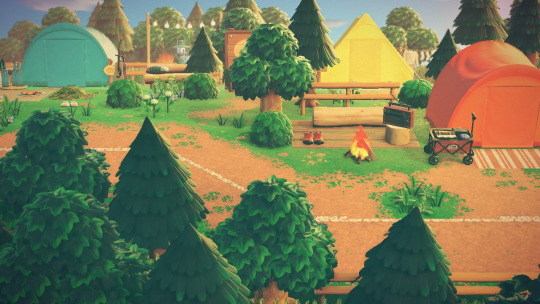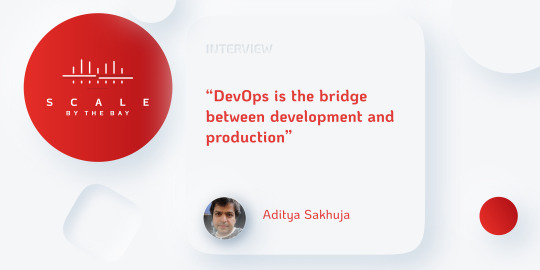#the creator that inspired me to do the challenge of keeping the res services tent finished their island!
Text






🌲my visit to the dream of this beautiful island by bois crossing on youtube🏕️
#the creator that inspired me to do the challenge of keeping the res services tent finished their island!#and its sooooooo pretty!!#def a great source of inspiration for the challenge and a camp-themed island in general🏕️✨✨✨#im linking to the video tour they posted on their channel🌲#acnh#animal crossing#animal crossing new horizons#new horizons#acnh dream visit#acnh dream tour#acnh dream address
272 notes
·
View notes
Text
Aditya Sakhuja - “DevOps is the bridge between development and production”

Aditya Sakhuja is an Engineering Lead at Salesforce working on Einstein products. He worked on prototyping a question answering system very early in the Salesforce Machine Learning journey. His extensive industry experience over the last 10+ years at Salesforce Einstein and previously at Yahoo Search building early prototypes to shipping ML products and supporting offline pipelines brings valuable lessons to talk. Besides question answering, Aditya helped build other ML products like Einstein Case Classification, Einstein Article Recommendations, and ML product prototypes with external partners like Google. He was a recipient of team innovation awards in 2018, 2019 at Salesforce. Previously, he built data platforms at Yahoo working on offline data pipelines and near real-time data platforms - relational stores, Hadoop / Spark, Storm, HBase. Very early in his career, he worked on pre-production performance analysis learning how to build and measure low latency highly scalable systems. He has deep domain knowledge of Search Systems in web and enterprise settings along with data infra, data pipelines, production-ready ML products. He got his Masters in Computer Science from Georgia Institute of Technology and Bachelors from the University of Pune, India.
What are the highlights of your software engineering career? How did you get into your current area, and what’s the most interesting thing about it for you? What made you especially prepared for your work?
Working at Yahoo Search team after graduating from GaTech, gave me an unique perspective on building large-scale distr systems blended with complex algorithmic challenges in Information Retrieval and NLP. That inspired me to spend even more time under the hood of large-scale systems focusing on pre-prod performance analysis of complex building blocks of modern-day architecture – message queues and search. I went on to join a smaller company continuing my passion for distributed systems to re architect their search infrastructure and in the process achieved significant performance and availability gains.
The breadth of experience I gained early in my career enabled me to start something new at Salesforce and then go on to build end-to-end machine learning NLP products with very talented teams. Staying motivated to pick up new skills along the way on the job and through targeted project based learning was also key to pushing me beyond the edges of my expertise and comfort zone.
Innovation happens on the edges of existing fields, product space, language paradigms, frameworks and not in a totally independent space. The secret to starting new initiatives is to identify that edge, identify what’s needed or missing beyond it, and then stay focussed to build further from it.
Finally, I’m passionate about giving back to the community through mentoring, volunteering, contributing to Open Source and Organizer for technical events.
A key theme that unites the best SBTB talks is Thoughtful Programming. Can you describe some situations where you stepped back and rethought your approach? Where you needed better or higher abstractions? How do the choices of technology help you being thoughtful?
Engineering is a lot about tradeoffs and prioritization. One instance I can think of is the approach we adopted to containerize our model training pipeline early in the cycle after realizing the pain points of multiple rounds of validations on different environments and the probability of regressions between dev and prod environments without a common baseline. I’ll touch more such examples in the talk. Definitely tune in.
How do tools and DevOps infrastructure affect your life day to day? How do you see developers and operators (DevOps) working together in the future? What needs to be done to improve it on your end?
The way I look at it is – DevOps to quite an extent is the bridge between development and production or site reliability. As the tools abstracting the underlying infrastructure continue to help with simplifying its setup and maintenance along with reliable application deployment flows, the line between product engineers and devOp engineers would continue to blur. DevOps is often associated with Continuous Integration and Delivery. Less talked about but as critical are the post deployment flows forming the three pillars of Observability for tracking system health (latency, throughput, service availability) and business health (KPIs). These 3 pillars are metrics tracking, logs monitoring and tracing, along with alerting when applicable. Finally, containerization and container management infrastructure is bringing the app developers to the operations tent and helping drive towards build once deploy everywhere strategy.
“Cloud-Native” computing as it first emerged is operator-centric. It’s getting easier to run the clouds themselves. Does it get easier for developers to build apps on top of these new clouds? What kind of abstractions are needed to develop the Cloud-Native Applications of tomorrow?
Containers and container orchestration is the answer to maintaining cloud independence and being agnostic of the underlying infrastructure. The house movers don’t want to know if the packed box contains kitchen items or your office equipment. They want the boxes to be easily optimized to fit in the truck. Similarly, what goes inside the container should not be addressed every time one needs to think of deploying, keeping them independent of the cloud providers. The containers abstract that out. Developers should adopt container based dev - validate cycles as cloud native architecture becomes more of a norm.
What are some of the ways we can make the best lemonade out of the lemons online-only set up this year? How do you plan to make the best of it?
Going virtual first has it’s advantage of reaching thousands of software creators if not tens of thousands. I’m hoping it would let the attendees jump between sessions and look up relevant material around the presentation topics from the comfort of their couch. Pretty good deal. In-person networking would definitely be missed. In the absence of that, social channels are a great way to stay connected with the speakers and your fellow attendees. Happy to connect. You can find me on Twitter @sakhuja and on LinkedIn.
What are some other talks that you’re eager to see at SBTB, and which ones look like good companions for yours?
There are many interesting talks, here are few shortlisted –
David Talby’s talk on State of the art natural language understanding at scale
Dean Wampler’s talk on Ray: A System for High-performance, Distributed Machine Learning Applications.
Li Haoyi talk.
Also, looking forward to Chester Chen’s talk on “Creating an Architecture for Analytics”.
Don’t miss Aditya’s talk NLP text recommender system journey to automated training pipeline with Spark and Sagemaker at Scale by the Bay!
0 notes